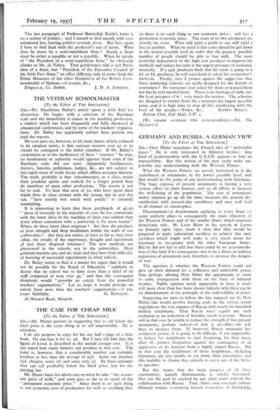THE VETERAN SCHOOLMASTER
[To the Editor of THE SPECTATOR.]
Si,—Dr. Shackleton Bailey's article opens a wide field or discussion. He begins with a criticism of the Burnham scale and the immobility it causes in the teaching profession, a subject which has been frequently and fully discussed at educational conferences, and by some of the teachers' organisa- tions. Dr. Bailey has apparently neither been present nor read the reports.
He soon goes on, however, to his main thesis, which, reduced to its simplest terms, is that assistant masters over 45 or 50 should be consigned to the lethal chamber. If Dr. Bailey's contentions as to the inefficiency of these " veterans " be true, no headmaster or authority would appoint them even if the Burnham, scale did not exist. Apparently headmasters, doctors, lawyers, politicians, judges, &c., are not subject to this rapid onset of senile decay, which afflicts assistant masters. The truth probably is that schoolmasters, as a class, retain their youthful spirits and outlook for a longer period than do members of most other professions. The reason is not far to seek. To hear that men of 50, who have spent their whole lives in close contact with the young, day in and day out, "have mostly lost touch with youth," is certainly astonishing.
It is interesting to learn that these greybeards of 45-50 " must of necessity in the majority of cases be less conversant with the latest ideas in the teaching of their own subject than those whose connexion with a university is far more recent." Where do these latest ideas originate ? Are they the products of pure thought and deep meditation within the walls of our u niversities ? Are they not rather, at least as far as they have value, the results of the experience, thought and experiment of just these despised veterans ? The new methods are discovered in the schools, not in the universities. Most assistant masters can, and do, read, and they have little difficulty in learning of successful experiments in other schools.
Dr. Bailey seems to find it a matter for regret that it would not be possible for the Board of Education "suddenly to decree that no school was to have more than a third of its staff composed of men over 45," and that the consequent dismissals would "provoke an outcry from the powerful teachers' organisations." Let us hope it would provoke an outcry from more than the teachers' organisations.—I am,














































 Previous page
Previous page